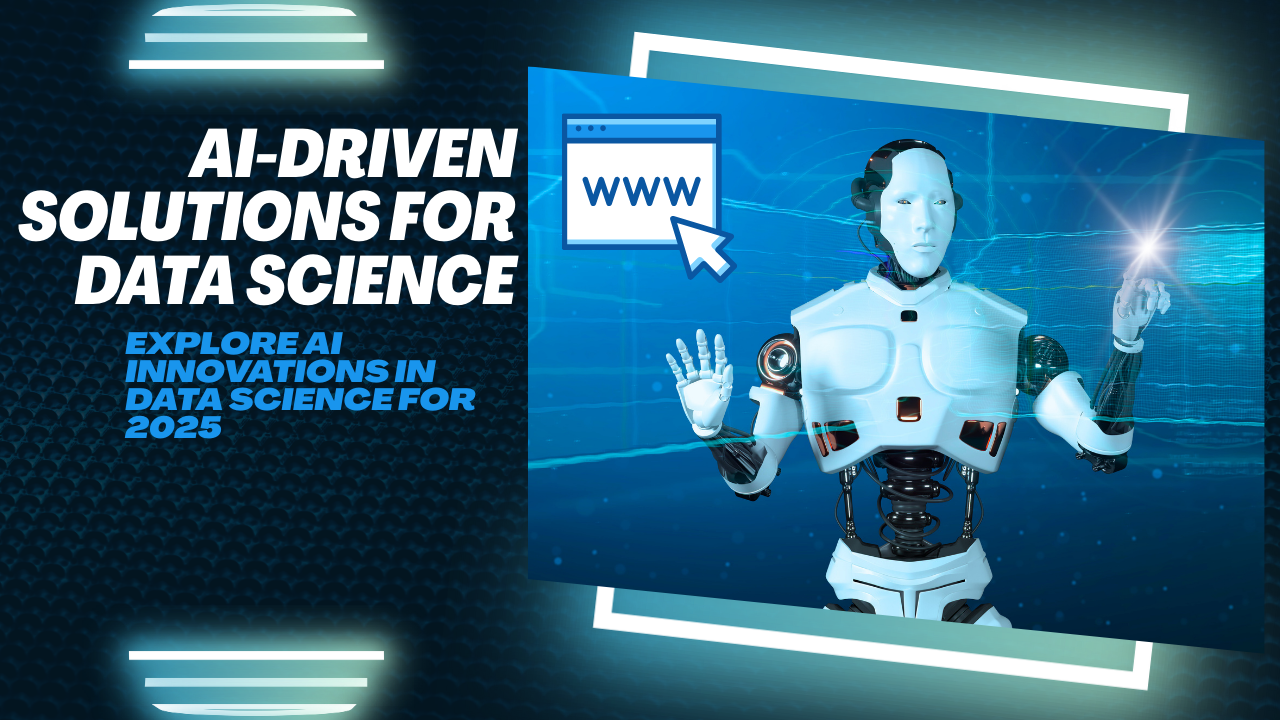Artificial Intelligence (AI) is no longer a futuristic concept—it’s the engine powering today’s most transformative innovations across industries. Nowhere is this more evident than in data science, where AI-driven solutions are accelerating the path from raw data to real-world impact.
From healthcare and finance to retail and logistics, businesses are using AI to unlock smarter insights, automate decisions, and drive efficiency at scale. In this post, we’ll explore the most powerful ways AI is being applied across the data science lifecycle in 2025—and how your business can benefit.
1. Automated Data Preparation and Cleaning
Data scientists spend up to 80% of their time cleaning and preparing data. AI now automates large portions of this task. Using machine learning (ML) algorithms, tools can:
-
Identify and correct data anomalies
-
Detect outliers
-
Normalize and impute missing values
-
Suggest schema or structure
Tools like DataRobot and Trifacta reduce the time spent on preprocessing, allowing teams to focus on modeling and analysis.
2. AI-Powered Predictive Analytics
Predictive analytics uses historical data to forecast future outcomes. Thanks to AI, models now learn patterns more efficiently, adapt in real time, and deliver sharper predictions.
Use cases include:
-
Customer churn prediction
-
Demand forecasting
-
Credit risk analysis
-
Predictive maintenance in manufacturing
By embedding AI into predictive models, businesses not only anticipate problems—they prevent them.
Internal link suggestion: See our blog post on [Top Tech Tools Every Startup Should Be Using in 2025] for predictive analytics software recommendations.
3. Natural Language Processing (NLP) for Unstructured Data
Over 80% of business data is unstructured—emails, social media posts, customer reviews, and more. NLP enables data scientists to extract insights from this massive, previously untapped resource.
With AI-driven NLP, businesses can:
-
Analyze customer sentiment in real time
-
Classify and route support tickets
-
Detect fraud or compliance violations in communications
Example: Financial institutions use NLP to monitor insider trading risks by scanning millions of messages for suspicious activity.
4. Computer Vision and Image Analytics
AI has transformed how we extract information from images and video. In data science, computer vision plays a crucial role in industries like:
-
Healthcare: Diagnosing diseases from radiology scans
-
Retail: Inventory tracking using camera feeds
-
Agriculture: Monitoring crop health via drones
Machine learning models trained on large image datasets can now outperform human specialists in accuracy for specific tasks.
5. Real-Time Decision Making with Edge AI
Real-time decisions matter more than ever. Edge AI—where data is processed locally on devices rather than in the cloud—is helping industries move from reactive to proactive.
Use cases include:
-
Autonomous vehicles making split-second navigation choices
-
Smart factories adjusting machinery in real time
-
Retail stores optimizing shelf restocking based on foot traffic
This shift empowers businesses to operate more autonomously and efficiently without latency issues.
6. AutoML: Making AI Accessible to All
AutoML (Automated Machine Learning) platforms enable non-experts to build high-performing models without writing code. These platforms automate:
-
Feature selection
-
Model training
-
Hyperparameter tuning
By democratizing access to AI tools, businesses without in-house data science teams can still compete using AI-powered insights.
External link suggestion: Google Cloud AutoML and H2O.ai are leaders in this space.
7. AI in Data Governance and Compliance
With increasing data regulations like GDPR and CCPA, maintaining compliance is non-negotiable. AI supports governance by:
-
Flagging sensitive data automatically
-
Monitoring data access in real-time
-
Ensuring audit trails are maintained
This reduces the risk of data breaches and regulatory fines.
Final Thoughts: AI Is Not Replacing Data Scientists—It’s Empowering Them
AI-driven solutions are not here to replace the human element in data science—they’re here to enhance it. By automating repetitive tasks, improving model accuracy, and unlocking insights from complex data, AI allows data scientists to focus on strategic thinking, creativity, and business impact.
Whether you’re a startup or an enterprise, now is the time to explore how AI can elevate your data strategy. At GetMorc, we stay at the cutting edge of AI and data science to help businesses harness these tools effectively.
Want to integrate AI into your business data workflows?
Contact GetMorc today for a tailored consultation.






